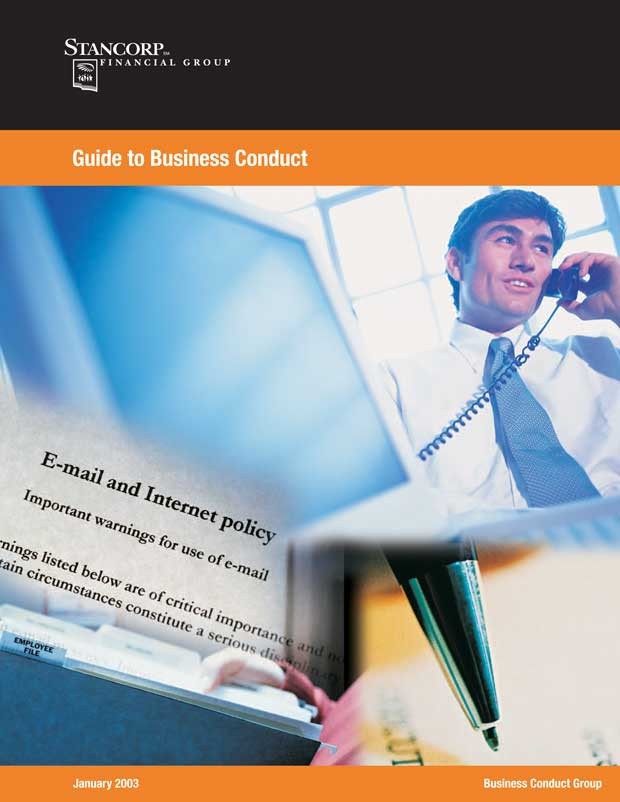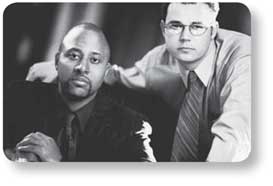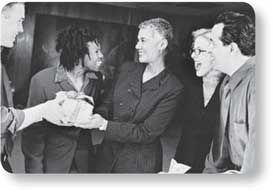EXHIBIT 14.3

January 2003
TheGuide to Business Conduct is applicable to the employees, contractors and
representatives of StanCorp Financial Group, Inc. and its subsidiaries.
| | |
| Table of Contents | | |
| |
A Message from Eric Parsons | | 1 |
| |
Introduction | | 2 |
| |
StanCorp Financial Group Mission Statement | | 3 |
| |
Ethics Statement | | 3 |
| |
Laws | | 3 |
| |
Conflict of Interest | | 4 |
| |
Gifts, Gratuities and Entertainment | | 5 |
| |
Privacy and Confidentiality | | 6 |
| |
Political Activities | | 7 |
| |
Employment Practices | | 7 |
| |
Insider Information and Securities Trading | | 7 |
| |
Copyright Protection | | 8 |
| |
Financial Controls | | 8 |
| |
Company Records | | 9 |
| |
Use of Company Resources | | 9 |
| |
Electronic Communications | | 9 |
| |
Consequences of Compliance and Ethics Violations | | 10 |
| |
Where to Find Additional Resources | | 10 |
| |
How to Report Violations and Concerns | | 11 |
I

A Message from Eric Parsons
StanCorp and its subsidiaries are well known for high ethical standards and integrity. This reputation is the result of daily decisions each of us, as employees, contractors or representatives of the company, make on how we do our jobs and how we work with our fellow employees, customers and members of the public. To succeed over the long-term, either personally or as a company, ultimately requires us to always conduct ourselves and our activities with integrity and the highest standards of ethical behavior.
ThisGuide to Business Conduct is provided to help remind each of us of the legal and ethical standards that must govern and influence all of our business activities. Each of us has a personal responsibility for the appropriateness of our actions and for maintaining the highest ethical standards as we perform our duties.
Although it provides guidance on standards of conduct, theGuide is not all-inclusive. It does, however, underscore the basic principles that should influence all our conduct — good judgment, personal honesty and sound business ethics. These principles require us to avoid any conflict of interest between our work and personal interests, comply with all laws and regulations that govern our business, and be honest and fair in all our work activities and relationships.
Because our continued reputation for excellence depends on our personal adherence to these principles, I encourage you to become familiar with theGuide and incorporate it into your daily work. If you have a concern about what is proper conduct for you or anyone else, you should raise that concern with your supervisor or with one of the other contacts listed in theGuide. Nothing — not competitiveness, an order from your supervisor or staying within budget — should compromise your integrity and the company’s expectation that we achieve the highest level of ethical conduct.

Eric E. Parsons
President and Chief Executive Officer
1
Introduction
A strong commitment to high ethical standards and full compliance with laws, regulations and policies benefits us all. It enhances our reputation for integrity, helping StanCorp Financial Group, Inc. and its subsidiaries (the company) attract and retain customers and maintain good relationships with our regulators. It reduces the risk of expensive fines and legal liability, protecting earnings and shareholder value. It provides a strong foundation for expansion into new business ventures, allowing the company to grow. And it helps us make informed business decisions and avoid inadvertent violations of corporate policy and laws.
TheGuide to Business Conduct is intended to be a resource to all employees, contractors and representatives of StanCorp and its subsidiaries, helping them to respect and obey the letter and spirit of all applicable laws and regulations, and to conduct their business activities with the highest ethical standards and level of integrity. Even where laws or their enforcement are permissive, StanCorp chooses the course of the highest integrity. Company management and the Board of Directors carehow we get results, not just that they are attained.
Each of us is responsible for reading and becoming familiar with thisGuide and avoiding any conduct or situation that violates or gives the appearance of violating theGuide. Supervisors are responsible for ensuring their employees are aware of theGuide and understand its contents, as well as providing assistance for resolving questions regarding theGuide or related policies.
TheGuide is intended to help you better understand StanCorp’s expectations in business activities. If any doubt exists about the appropriateness of a particular situation, the following questions may be useful:
| • | Will the action be ethical and honest in every respect? |
| • | Will the action appear unethical or dishonest to others? |
| • | Could the action be explained to management? |
| • | Does the action fully comply with applicable laws and company policies and procedures? |
2
StanCorp Financial Group Mission Statement
StanCorp has adopted the following mission statement that guides its strategies while supporting the management team in maintaining focus, reaching decisions and leading employees to creative solutions to address customers’ evolving needs.
The people of StanCorp Financial Group meet and exceed customers’ needs for financial products and services in growing markets where the application of specialized expertise creates potential for superior shareholder returns.
Much of StanCorp’s success has been and will continue to be attributed to the company’s adherence to the highest levels of ethical conduct. The company has developed a well-deserved reputation as a business that can be trusted to behave in an honest, fair and ethical manner.
Ethics Statement
While StanCorp cannot prescribe rules of personal conduct applicable to every possible situation, the company has established the following broad ethics statement providing direction as to the method in which business activities should be conducted.
The people of StanCorp Financial Group will observe the highest standards of honesty and fairness in the conduct of our business, earning the trust and respect of customers, investors, regulators, business partners and the general public.
Laws
StanCorp requires compliance with all laws and regulations applicable to its business, wherever conducted. The company and its subsidiaries operate in highly regulated industries and it is our intent to earn and maintain the trust of our various regulators. Compliance with the law means observing both the letter and spirit of the law in the conduct of all business affairs.
The purpose of thisGuide and related company policies and procedures is to set standards that will encourage ethical behavior and full compliance with laws applicable to most or all employees. TheGuide, however, is not intended to specifically address all laws to which the company or its divisions or subsidiaries may be subject. Officers, managers and supervisors are responsible for becoming familiar with the various standards and legal requirements applicable to their organization and providing sufficient training to ensure compliance. All individuals are responsible to seek counsel from internal legal staff or their division or subsidiary compliance officer (see page 10), whenever appropriate.
Compliance with all laws is so vitally important that failure to meet legal requirements cannot be excused by claims of ignorance, good intentions or failure to seek timely advice.
3
Conflict of Interest
The term “conflict of interest” describes any circumstance that could cast doubt on your ability to act with objectivity and in the best interests of the company.
The company recognizes and respects your right to take part in financial, business and other activities outside your employment relationship with StanCorp; however, these activities must be free of any conflict with company responsibilities.

Potential conflicts of interest can arise in many circumstances. The principles set forth in thisGuide, and company policies and procedures addressing such subjects as procurement, expense reporting, use of company property and internal business controls, are all intended to set appropriate standards of conduct to avoid conflicts of interest.
All potential conflicts of interest should be disclosed to an appropriate resource as identified in thisGuide. This reporting resource should not be directly involved in the potential conflict, and should have sufficient responsibility and authority to adequately reach an independent determination regarding the potential conflict.
Personal Financial Interests
Personal financial interests, or those of relatives or friends, must not adversely affect or conflict with the proper performance of work responsibilities or the company’s best interests. To maintain independent judgment and action, avoid any potential conflict of interest (or the appearance of such conflict) arising from personal financial interests.
A similar responsibility exists if you or members of your immediate family have personal financial involvement in an organization with which the company is contemplating or currently doing business. In such a case, you must promptly disclose to your immediate supervisor your interest in the other organization and, if a conflict of interest exists, resolve it to the company’s satisfaction.
Investments in equity or debt instruments amounting to minimal ownership interest in a company would not ordinarily constitute a conflict of interest; however, such investments should be disclosed if the company has a business relationship with StanCorp.
Outside Employment
Employment with StanCorp requires that employees refrain from any outside employment or personal business enterprise that interferes with company work hours or the ability to perform company duties properly or presents an actual, perceived or potential conflict with the company’s interests. Employees should notify their immediate supervisor or appropriate resource (see page 10) before accepting any outside employment or pursuing a personal business enterprise
4
that conflicts or could be perceived as conflicting with company employment or the company’s interests. Company resources (facilities, equipment, labor, information or supplies) or working hours may not be used to conduct non-company business.
Potential conflicts of interest automatically exist if a StanCorp employee performs work as an independent contractor, employee or consultant for any competitor or supplier of the company.
Memberships
StanCorp is proud of its long-standing tradition of contributing to the communities in which it does business. Additionally, the company actively encourages and supports employee participation in professional, civic, charitable and educational activities. This participation should be carefully considered to ensure against any conflict with company interests and discussed with your immediate supervisor or appropriate resource (see page 10) if it involves the use of company resources or occurs during work hours.
Product Endorsements
Occasionally, suppliers or customers may ask the company to endorse, promote or give testimony for products, services or equipment used by the company. Such requests should be forwarded to the Public Affairs and Communications Department for review to determine whether approval would be in the company’s best interest.
Gifts, Gratuities and Entertainment
Business decisions must be made impartially on the basis of appropriate factors such as price, quality, service and financial responsibility. Employees must ensure that any gratuity received or offered does not have the effect or appearance of making business decisions based on special favors and gifts.

Employees may occasionally accept or offer meals, entertainment or other hospitality (including cultural, social and sporting events) to enhance responsible business or customer relations if such hospitality is of reasonable cost under the circumstances. A good way to assess this is to ask whether such activities should qualify as an appropriate business expense. Employees should not offer or accept any gratuity, entertainment or hospitality if others could reasonably view acceptance as obligating the recipient to give business or other special considerations to the donor that are not extended to others.
The acceptance or offer of a gift of nominal value, offered as a common business courtesy or promotional item, is not considered improper, unless acceptance might be viewed by others as obligating the recipient to give business or other special considerations not extended to others. The acceptance or offer of a gift should be disclosed to your immediate supervisor.
5
In general, affirmative answers to all of the following criteria would indicate the receipt of a gift is acceptable:
| • | The gift is of nominal value. |
| • | The gift is customary and does not create any appearance of impropriety. |
| • | The gift imposes no sense of obligation on the giver or receiver. |
| • | The gift results in no special or favored treatment. |
| • | The gift would not be considered extravagant, excessive or too frequent considering all of the circumstances, including the ability to reciprocate in kind, at company expense. |
| • | The gift is disclosed to your immediate supervisor and is not concealed in any way. |
Gifts deemed inappropriate should be politely returned with an explanation of the company’s policy regarding gifts.
Privacy and Confidentiality
StanCorp and its subsidiaries offer multiple products and services requiring access to and use of data that personally identifies individuals and employers. This data includes medical and financial records, Social Security and account numbers, addresses and all other data identifying an individual or group applicant or client.
The company places a high priority on ensuring that personally identifiable information is not disclosed, mishandled or used for any purpose other than a legitimate business use as authorized by the client or as permitted or required by law. Consult StanCorp’s Privacy Policy (www.stancorpfinancial.com/privacy_policy.html), distributed to certain classes of clients on an annual basis, for further information on the use and maintenance of client data and records.
Confidential information may also include the company’s proprietary information. Proprietary information is information that the company acquires or produces in conducting its business. The company’s proprietary information becomes confidential information when it is sensitive in nature or when it is not common knowledge among the company’s competitors, and it gives the company some advantage over its competition. It includes knowledge of any business or financial opportunity acquired in the course of employment.
The company has developed Information Protection guidelines that provide guidance and procedures to safeguard financial, health and other personally identifying information in the company’s possession. The statement also provides guidance on the handling of proprietary information of the company and insider information.
6
Misuse of proprietary information or the personal information of a client or co-worker is strictly prohibited. The obligation to protect StanCorp’s proprietary and confidential information from unauthorized disclosure continues even after you leave the company.
Political Activities
StanCorp strongly supports our representative form of government and encourages employees to participate actively in the political process as individual citizens. Additionally, the company recognizes and honors an employee’s right to political involvement in support of a cause or candidate the company may not support. However, unless the company authorizes work on a political campaign as part of an employee’s authorized duties, company policy does not permit employees to use paid work time, property, facilities or the company’s name in support or opposition of a political cause or candidate.
StanCorp does not condone political coercion in the workplace, and individuals are not required to make contributions to any political party, candidate or issue. Consistent with federal law, the company sponsors a Political Action Committee in which contributions are encouraged, but entirely voluntary. Contact the Government and Regulatory Affairs Department in the President’s Staff Division for additional information regarding the Political Action Committee.
Employment Practices
The company is committed to the principles and practices of equal opportunity and affirmative action to develop and maintain a highly qualified, diverse workforce. The company does not discriminate in employment on the basis of race, color, gender, national origin, religion, age, disability, sexual orientation, veteran status or any other status protected by applicable federal, state or local laws. Furthermore, the company will not tolerate any kind of workplace harassment, including sexual harassment.
Insider Information and Securities Trading
The company requires full compliance with laws prohibiting insider trading and stock tipping. Insider trading generally involves buying or selling securities while in the possession of “material nonpublic information.” Similarly, most stock-tipping violations involve disclosing such information to others, enabling the recipient to buy or sell securities on the basis of such information. It is the company’s policy that if a director, officer, employee, contractor or representative of the company has “material nonpublic information” relating to the company, neither that person nor any related person may buy or sell securities of the company or engage in any other action to take advantage of, or pass on to others, that information. This policy also prohibits trading in the securities of other companies such as potential acquisition candidates, subsidiaries, suppliers, customers or companies in which the company has an investment interest or business relationship about which the employee has material nonpublic information.
7
“Material information” is any information that a reasonable investor would consider important in a decision to buy, hold or sell a security. In short, this covers any information that could reasonably affect the price of the stock. Common examples of information frequently regarded as “material” are projections of future earnings or losses; news of a pending or proposed merger, acquisition or tender offer; news of significant sales of assets or disposition of a subsidiary; changes in dividend policies, declaration of a stock split, or the offering of additional securities; changes in executive management; significant new products or discoveries; impending bankruptcy or financial liquidity problems; and the gain or loss of a substantial customer or supplier. Either positive or negative information may be material information.

The determination of whether the information is “public” is often a matter of timing. Federal law imposes upon employees who trade in company stock the burden of proving that their trades were based on information readily available to the public. For that reason employees should not trade on any information unless they can clearly demonstrate that the investing public has had sufficient time to receive the information and act upon it. For example, it would be improper for an employee with advance knowledge of material nonpublic information to place trade orders immediately after the information has been announced publicly but before the public has had sufficient time to act upon it.
Transactions necessary or justifiable for independent reasons (such as the need to raise money for an emergency expenditure) are no exception. Additionally, gain or loss associated with an investment is not a criteria used in determining if the investment activity was in violation of insider trading laws.
Copyright Protection
Copyright law grants the authors of creative works the exclusive rights to control its reproduction or distribution. Creative works can include written materials, photographs, music, artwork, Internet content and software. Virtually all materials of this nature are copyright protected and neither a copyright notice nor registration is required for protection. Copyright violations are viewed as serious offenses that may result in criminal prosecution.
Financial Controls
The books and records of StanCorp must accurately reflect all measurable transactions. False or artificial entries in any book or record will not be tolerated. The company maintains a system of financial controls and recordkeeping such that it can confidently make public assurances regarding the accuracy and integrity of its financial statements including the following specific areas:
8
| • | Assets, liabilities and ownership interests exist at a specific date and recorded transactions represent events that actually occurred during a certain period. |
| • | All transactions and other events and circumstances are recognized and reported in the proper period. |
| • | Financial statement entries, including amounts based upon management’s assumptions and estimates, are recorded at appropriate amounts in conformity with relevant and appropriate accounting principles. Individual transactions are mathematically correct and appropriately summarized and recorded. |
| • | Entries in the financial statements of the company are properly described and classified. |
Company Records
Company records shall be maintained and safeguarded through a companywide, uniform records management program for the time required to meet legal and regulatory requirements, and to support effective business operations.
If company records contain financial, health or other personally identifiable information or proprietary information relating to business operations, specific guidance within the Privacy and Confidentiality section of theGuideand Information Protection guidelines should be followed.
Use of Company Resources
Use good judgment to conserve company supplies and resources. Unless specifically authorized, company resources are to be exclusively used for business purposes. Any authorized personal use of company resources must not, in any event, result in significant added cost, disruption of business processes, any illegal activity or any other disadvantage to the company.
Electronic Communications
The company provides computing resources and access to its computer networks as a business tool to accomplish business objectives. As such, computer systems and software should be used for business purposes and in conformity with the company’s ethical principles. Computer resources cannot be used to steal, harm or harass others, interfere with other employee’s work, or access another employee’s data. In addition, employees have a responsibility to assist company efforts to protect the integrity of its computer networks and stored information. Data security schemes, authorization mechanisms, anti-virus products and software licensing agreements cannot be compromised or altered.

9
Access to the Internet and electronic communications, such as e-mail, using computer equipment or networks supplied by the company are not private. These communications, as well as any files stored on company resources, may be monitored, recorded or reviewed by the company without notice or other restriction.
The company’s Information Protection practices should be followed if electronic records contain financial, health or other personally identifiable information or proprietary information relating to business operations. Additional guidance on e-mail usage, Internet usage, workstation security, user security and enforcement may be found in the company’s Workstation Security Policy Overview.
Consequences of Compliance and Ethics Violations
TheGuide to Business Conduct is important and must be taken seriously by all. Violations of theGuideor related company policies and procedures will result in appropriate disciplinary action that may include termination of employment. In the case of violations of law, civil or criminal prosecution may result.
Where to Find Additional Resources
Because theGuideis not intended to be an all-inclusive reference, the following resources are available for additional guidance:
| • | Relevant policies and procedures |
| • | Your supervisor or manager |
| • | Human Resources Department |
| • | Business Conduct Department |
| • | Internal Audit Department |
| • | Your division or subsidiary compliance officer |
10
How to Report Violations and Concerns
If you believe an employee, contractor or representative of the company is acting in a way that may be illegal, fraudulent, dishonest or unethical, or if you have knowledge of an illegal, fraudulent, dishonest or unethical act against the company, you are required to report it. If you are uncomfortable talking with your supervisor, these resources are available to you:
Internal Resources
| • | Your division or subsidiary compliance officer |
| • | Assistant Vice President, Internal Audit |
| • | Vice President, Human Resources |
| • | Director, Business Conduct |
| • | StanCorp’s Chief Compliance Officer |
External Resources
The company recognizes there may be circumstances where reporting a violation or concern to someone within StanCorp may be difficult or uncomfortable. To ensure all employees, contractors, or representative have a reporting alternative free from barriers, StanCorp has retained the services of an independent company, Global Compliance Services, to provide an alternative reporting mechanism. Their Alertline® service is available by phone twenty-four hours a day, seven days a week, for the reporting of violations and concerns, and callers may remain anonymous. Global Compliance Services will receive the caller’s information, and, acting as an intermediary, relay that information to StanCorp for investigation and resolution. A feedback mechanism to the caller is provided as part of this service.
To reach Global Compliance Services’ Alertline®, call (800) 381-8693.
Safeguards
The company prohibits retaliation against anyone for reporting or supplying information about violations, or potential violations, of theGuideor related policies or procedures. To every extent possible, the company will keep confidential the identity of anyone reporting a concern or possible violation of theGuide.
11

StanCorp Financial Group, Inc.
1100 SW Sixth Avenue
Portland OR 97204
10973(1/03)







